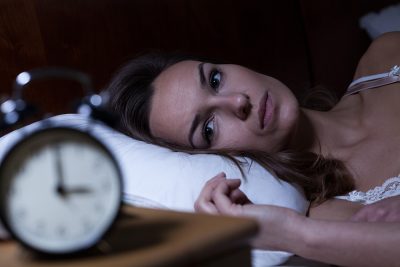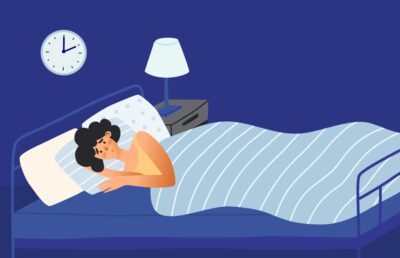Table of Contents
The data is in: Some of us are sleeping better than others — wealthy white Americans, to be exact. The Centers for Disease Control and Prevention (CDC) put sleep equality front and center in a recent survey of nearly half a million adults, and the results were eye opening: Just like in many other areas of life, racial and income equality play a significant role in the quality of sleep people are getting.
Though it often is the first thing to fall to the back-burner, sleep is a hugely important contributor to our overall health — poor sleep can have serious long-term consequences.
“Long-term consequences [of not getting enough sleep] include increased anxiety and depressive symptoms and increased risk of obesity, diabetes, hypertension, and cardiovascular disease, says Dr. Carleara Weiss, Ph.D., MS, RN, and Aeroflow Sleep’s Sleep Science Advisor. “Along with those problems, people may also experience impairment in physical performance, reduced attention, concentration, and memory, and may be at risk for developing dementia later in life.”
Read on to learn more about sleep inequality in the United States.
How Can Inequality Affect Sleep?
Inequality can have a significant impact on sleep health, and that inequality can stem from a variety of different everyday factors — read on below to find out more.
Employment Status and Work Environment
A recent study from Yale University found that disparities in sleep duration were highest among middle-aged Black adults, leading research to conclude working or environment conditions could be disproportionately preventing this demographic from getting adequate sleep. Similarly, another study found that non-Mexican Hispanic adults — another demographic that faces discrimination within the job market — were 26 percent more likely to be short sleepers than non-Hispanic white Americans.
The link between working conditions, employment status and sleep is significant: A 2024 survey by Sleepopolis found that most Americans are thinking about finances when they find themselves lying awake at night, unable to sleep. White Americans are the least likely to struggle with finding employment, which means they likely have less financial stressors than other demographics.
Noise Pollution
Additionally, noise pollution, defined as annoying or harmful noise in an environment, can also have a significant impact on sleep health. Harvard professionals found that non-white residents are disproportionately impacted by noise pollution such as traffic noise, which can have a definitive impact on someone’s chances of falling and staying sleep.
The long story short: inequality can have a significant impact on a person’s ability to get a good night’s sleep, and the challenges can stem from a variety of stressors.
Medical Access and Care Quality
According to the Centers for Disease Control and Prevention (CDC), “People with disabilities and people from some racial and ethnic minority groups, rural areas, and White populations with lower incomes are more likely to face multiple barriers to accessing health care.”
Additionally, racial bias can affect the quality of care certain demographic groups receive — for example, Black Americans are proven to be undertreated for pain compared to white Americans, and 63 percent of Hispanic adults consider medical providers being less likely to provide them with advanced care a reason behind worse medical outcomes for their demographic.
Unsurprisingly, minority demographics are also largely under diagnosed for a variety of medical conditions, including sleep apnea — Black Americans are considered to be at high risk for the condition, but are much more rarely tested and treated than their white counterparts.
“Health inequalities and racial disparities make Black Americans less likely to be diagnosed with obstructive sleep apnea (OSA),” explains Weiss. “Research shows that African Americans often have more severe OSA when compared to Caucasian and Latinos, are less likely to comply with treatment due to cultural and financial limitations and are susceptible to high blood pressure because of OSA. Researchers also found that cultural beliefs and lack of trust in the medical system may affect Black Americans’ diagnosis and treatment for OSA.Putting in perspective, it seems that sleep inequality, like many other health disparities, is a consequence of long-lasting problems that racially segregate our communities.”
“Racially minoritized groups experience historical limitations to healthcare that are beyond their responsibility,” Weiss continues. “Among these factors, we can emphasize socioeconomic status, implicit bias, and cultural beliefs may affect access to healthcare among Latinos and African Americans. These disparities affect sleep as a pivotal component of health.”
Additionally, women are also less likely to be diagnosed with sleep apnea because the symptoms tend to manifest differently for them, and because the female presentation of symptoms is understudied.
Statistics About Sleep Inequality
Sleep inequality can impact different demographics in a variety of ways — take a look at the illuminating statistics below.
- 35.2% of all US adults report sleeping on average less than 7 hours per night.1
- Individuals who perceived discrimination had more trouble falling asleep at night, and experienced less deep sleep, as well as more physical daytime fatigue.2
Racial and Ethnic Sleep Inequality Statistics
Racial inequality is still prevalent across society in many ways, and the impact it has on sleep is marked:
- According to the CDC, 46.3% of Native Hawaiians/Pacific Islanders, 45.8% of Black Americans, 40.4% of American Indians/Alaska Natives, 37.% of Asians, 34.5% of Hispanics, and 33.4% of Whites report they get less than 7 hours of sleep per night.3
- Compared to white participants, black participants were five times more likely to sleep less than 6 hours per night, according to a 2015 study. 4
- Black children are more likely than both Hispanic and White children to get insufficient sleep.5
- More than half of the discrepancies in health outcomes between White and Black people can be linked back to sleep differences. 6
- A 2015 study found that compared to white participants, Chinese participants were 2.3 times more likely to get less sleep.7
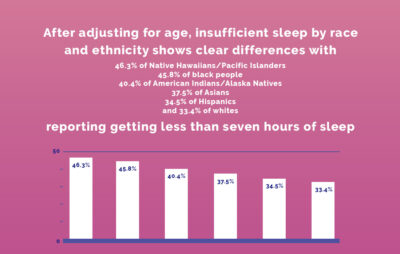
Gender Sleep Inequality Statistics
Thanks to hormones, physiological differences, and challenges with mental health and stress — not to mention unbalanced workloads — gender can also play a role in how well we sleep at night.
- Women are 40% more likely to be diagnosed with insomnia during their lifetime compared to men. 8
- Men are 2-3 times more likely than women to have obstructive sleep apnea.9
- Women are more likely than men to report feeling excessively tired and depressed, have difficulties with memory and concentration, and have trouble sleeping at night.10
- 77.3% of females reported feeling excessively tired or sleepy in the daytime compared to 65.5% of males, in a 2017 study published by the Journal of Clinical Sleep Medicine. 11
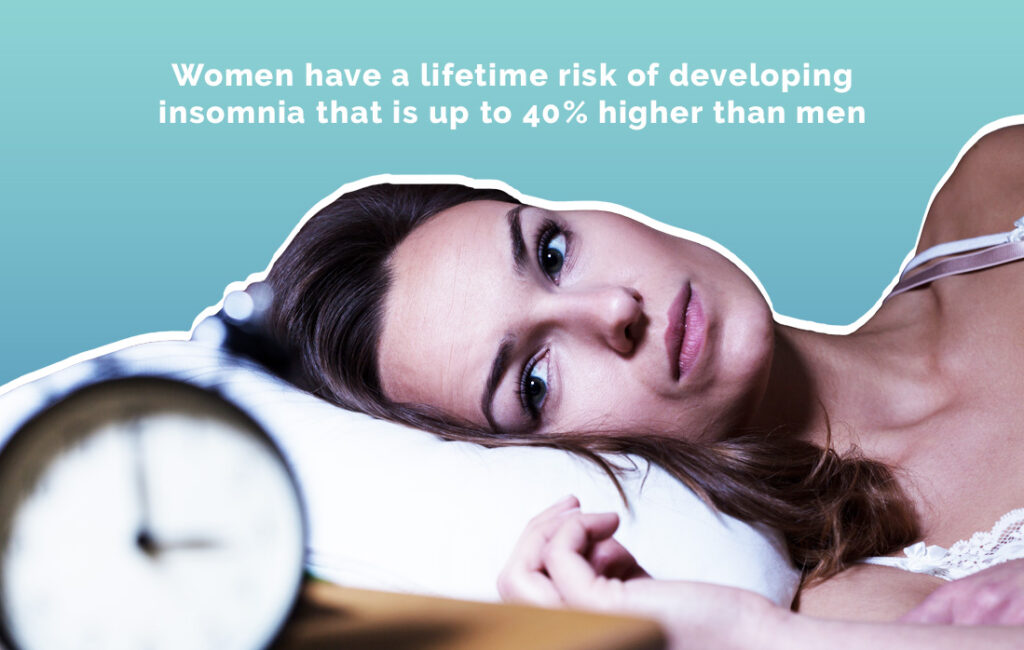
Income and Wealth Sleep Inequality Statistics
Wealth permeates all areas of our lives, so it’s no surprise that the more you have, the better you’re sleeping — and the healthier you are overall.
- Those who live in poverty often start experiencing poor sleep at a very young age which commonly persists into adulthood.12
- 61% of adults who work more than one job sleep 6 hours or less on weekdays. 13
- Diseases related to poverty are frequently the same as those associated with insufficient sleep, such as Type 2 diabetes and heart disease.14
- 22% of adults with family incomes below 100% of the federal poverty level have trouble falling asleep most days or every day, according to a study published by the CDC.15
- A study published in the American Journal of Epidemiology found that individuals with lower incomes took a significantly longer time to fall asleep and had worse sleep regulation.16
- Almost 35% of individuals living in households below the poverty threshold report getting less than 6 hours of sleep a night.17
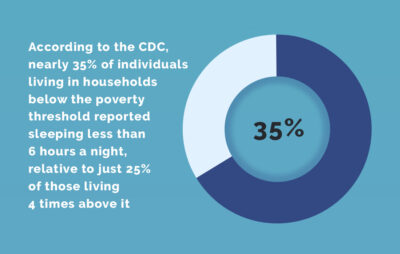
Educational Sleep Inequality Statistics
Having access to higher education can open so many doors — including the door to better sleep. Read on to find out how more education = more sleep.
- Those with a college degree or higher report the highest rates of healthy sleep. 18
- About 1 in 6 adults (17%) who have less than a high school diploma report having trouble staying asleep, according to the CDC.19
- Taking longer than 30 minutes to fall asleep at night is associated with lower education, no private health insurance, and food insecurity. 20
- 72.7% of high school students get an insufficient amount of sleep, with about 20% reporting they sleep fewer than 6 hours a night. 21
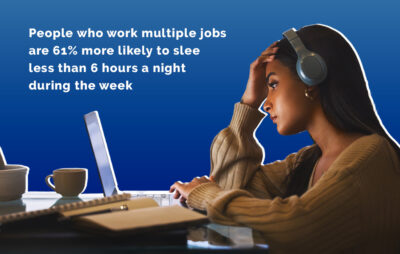
Mental Health and Sleep Inequality Statistics
Though conversations around mental health continue to gain traction, we still have a lot of progress to go. Anxiety, depression, ADHD and other mental health conditions all can have an effect on how well we’re sleeping — and vise versa, in some cases.
- In 2019-2020, over 50 million Americans (21%) were experiencing a mental illness.22
- People with anxiety are 5 times more likely to experience short sleep duration and have less efficient sleep. 23
- About 75% of those with ADHD also have sleep problems.24
- Adults with insomnia are 10 times more likely to develop depression than people who sleep well. 25
- 70-91% of people with PTSD also have trouble falling and staying asleep.26
- Almost 50% of insomnia cases are associated with depression, anxiety, or psychological stress. 27
Help Reduce Sleep Inequality
Sleep inequality is a massive issue that will require massive shifts in society to eradicate. However, there are some things you can do to help. The first thing is acknowledging the problem and raising awareness; if the majority of people don’t know about sleep inequality, there won’t be a push to fix it.
You can also consider donating to organizations or participating in demonstrations that highlight the issue. Sleep In Heavenly Peace, for example, strives to help children in need by donating beds and helping them find safe sleeping locations, and the Convent House does an annual Sleep Out to raise funds that provide homeless children with safe shelter and a place to sleep.
How Our Team Is Helping
Though we have a long way to fully eliminating sleep inequality, there are organizations doing what they can to tackle the problem. Last year, Sleepopolis partnered with Helix to contribute a significant donation to Sleep in Heavenly Peace, an organization dedicated to fighting bed poverty.
To show our continued support for their mission, Sleepopolis once again donated $30,000 as a part of our 25 Days of Giving campaign. The funds went directly to providing beds and a safe sleeping location for children in need.
We are honored to have such an amazing partner like Sleepopolis in helping us complete our mission to see that No Kid Sleeps on the Floor in Our Town!” said Luke Mickelson, Founder and Head of Development at Sleep in Heavenly Peace. “It is organizations such as Sleepopolis that help build communities and bring people together in a spirit of service and caring.”
Additionally, Sleepopolis team members volunteer with other sleep-centric organizations like Beds for Kids, a non-profit that strives to provide beds and essential furniture to children and families in need. While we know this is only making a small dent in the larger issue of sleep inequality, our team remains committed to doing our part to serve our community members.

Subscribe Today!
Get the latest deals, discounts, reviews, and giveaways!

